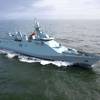Inditex Partners with Maersk to Reduce its Maritime Transport Emissions
Inditex, parent company of fashion brands such as Zara and Massimo Dutti, has partnered with Maersk to reduce its global GHG footprint from seaborne logistics by incorporating alternative fuels in all its inbound routes with the carrier.
Through the ECO Delivery Ocean program, Maersk replaces fossil fuels on its ships with green fuels like green methanol or second generation biodiesel based on waste feedstocks. This is expected to deliver an estimated reduction of more than 80% in GHG emissions compared to conventional sources.
With ECO Delivery Ocean, Maersk offers its customers the opportunity to handle transports completely with certified green fuels for a fixed cost. The corresponding GHG savings are confirmed to the customers with an externally verified certificate, and these transports will be exempted from EU Emissions Trading System (ETS) charges by Maersk in the future.
“This collaboration is a great example of how boosting innovative solutions with dedicated partners is key to fight climate change. Through this joint initiative with Maersk, we are making significant strides in reducing emissions associated with our sea freight. This project aligns with our goal to reach net zero emissions in 2040 and contributes to scale alternative fuels with a significant reduced carbon footprint,” says Abel Lopez, Head of Import, Export and Transport at Inditex.
Maersk says the demand for the very low GHG emission product ECO Delivery is high and very dynamic. A lot of customers are asking for a solution to reduce their scope 3 emissions, and the first customers are buying this premium solution for their whole cargo under Maersk Bill of Lading now.
Like Inditex, Maersk has the ambitious climate target to become a net zero company across all business areas until 2040. Besides using ECO Delivery for all its ocean cargo under Maersk care, Inditex is also boosting multimodal transport and is collaborating in a new rail solution pilot of Maersk, RENFE and Cepsa in the South of Spain which was launched this summer.















